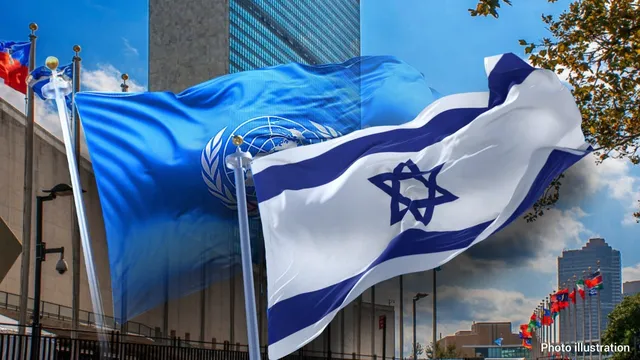
Israel bans UN aid agency from Gaza amid humanitarian scrutiny
2025-05-01 13:56- Israel's Knesset voted to ban UNRWA from Gaza and the West Bank in October 2024.
- The International Court of Justice is examining Israel's humanitarian obligations during a week of hearings.
- The outcome of the hearings may influence future humanitarian aid in the Palestinian territories.
Express your sentiment!
Insights
In the Netherlands, hearings have begun at the International Court of Justice (ICJ) focused on Israel's humanitarian obligations and its recent decision to ban the United Nations Relief and Works Agency (UNRWA), which provides essential services to Palestinian refugees in Gaza and the West Bank. This examination comes after a vote in Israel's parliament, the Knesset, in October 2024, which prohibited UNRWA from operating in these areas beginning January 2025. The hearings were initiated following a request from the UN General Assembly, reflecting a growing international concern regarding Israel's blockade and treatment of Palestinian civilians. The United Nations legal counsel emphasized Israel's responsibilities under international law as an occupying power, specifically mentioning the need to facilitate humanitarian aid for the residents of Gaza. In light of ongoing violence and instability, these obligations have taken on heightened importance, particularly given recent escalations and the humanitarian crisis resulting from Israel's military actions in Gaza. Israeli officials, however, have branded the proceedings at the ICJ as a politically motivated attempt to discredit their nation, claiming UNRWA has links to Hamas, a group Israel designates as a terrorist organization. Israeli Foreign Minister Gideon Sa'ar expressed disdain for the court's hearing, labeling it a 'circus' that undermines Israel's right to self-defense. Israeli Prime Minister Benjamin Netanyahu has supported efforts to dismantle UNRWA, arguing that the agency perpetuates the Palestinian refugee situation rather than alleviating it. As the ICJ proceedings unfold, they bring further international scrutiny on Israel's actions in relation to human rights and humanitarian law. The overall impact of Israel's ban on UNRWA could be dire, restricting essential services crucial for the Palestinian population. The International Court of Justice is expected to issue an advisory opinion only after the hearings conclude, but such opinions hold no binding power; however, they significantly influence interpretations of international law. As the world watches the degree to which Israel will accommodate humanitarian efforts, the outcome will likely shape the future of aid agencies operating in conflict-stricken areas like Gaza.
Contexts
The United Nations Relief and Works Agency for Palestine Refugees in the Near East (UNRWA) plays a crucial role in providing humanitarian assistance and developing essential services in Gaza and the West Bank. Established in 1949, UNRWA aims to support the Palestinian refugee population through education, healthcare, social services, and emergency aid, responding primarily to the challenges posed by the protracted conflict and ongoing political instability in the region. With millions of registered Palestinian refugees relying on its services, the agency operates schools, health clinics, and food distribution centers that form the backbone of support for these communities, contributing significantly to their resilience in times of crisis. UNRWA's operations are particularly vital in the context of the current economic and social challenges faced by Palestinians, exacerbated by years of conflict, blockade, and limited access to resources. In Gaza, UNRWA provides essential support to over 1.4 million registered refugees through a comprehensive range of services. Approximately 300,000 students attend UNRWA schools, which offer education while promoting peace and coexistence, despite the significant challenges posed by the blockade and recurrent violence. The agency also operates a network of health facilities, comprising over 20 clinics that deliver primary healthcare to over a million people annually. Moreover, in response to worsening socio-economic conditions, UNRWA has scaled up its cash assistance programs and food distribution to alleviate poverty and food insecurity, which has become a pressing issue for many families in the region. The ongoing humanitarian crisis in Gaza—including high unemployment rates, infrastructure deficiencies, and the impacts of the COVID-19 pandemic—has underscored the need for UNRWA's continued presence and support. In the West Bank, UNRWA similarly provides critical services to over 800,000 refugees. In addition to education and healthcare, UNRWA engages in community support programs aimed at fostering social cohesion and addressing unique challenges facing Palestinians, such as restrictions on movement and access to resources. The agency's interventions help empower communities, providing vocational training and support for women and youth, thus promoting resilience and self-sustainability. UNRWA's work in the West Bank reflects a broader commitment to the rights and needs of Palestinian refugees, addressing both immediate humanitarian needs and longer-term development goals within a complex political landscape. Despite its significant contributions, UNRWA faces considerable challenges, including funding shortfalls and political pressures that threaten its ability to operate effectively. Continued support from the international community is crucial to UNRWA's mission, ensuring that it can maintain and expand its services to meet the growing needs of Palestinian refugees. The agency represents not only a lifeline for many Palestinians but also a crucial player in the larger quest for peace and stability in the region. Given the ongoing humanitarian needs, the effectiveness of UNRWA's programs will remain a vital component in supporting Palestinian communities in both Gaza and the West Bank.